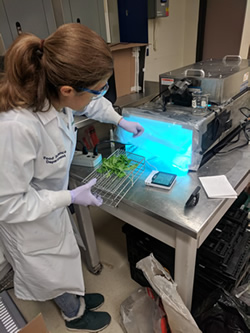Seeding Food Innovation - Awarded Project 2019
Sustainable Water Management and Reduced Food Waste in the Fresh Produce Chain using Advanced Oxidative Process based Treatments
ProjectDescription

This project will develop two Advanced Oxidation Process (AOP) based technologies to reduce the levels of microbes and pesticides on fresh produce. The AOP process is based on the generation of highly reactive free-radicals with the power to inactivate microbes, degrade pesticides and remove constituents in water that contribute to pollutants. A traditional AOP process uses hydrogen peroxide as the source of these radicals which although effective, is costly, challenging to control and has a relatively low efficiency.
In the proposed study, AOP based on chloride-radicals will be developed that overcomes the aforementioned limitations. Chloride-radicals are effective at low concentrations and have a life-time of seconds compared to the milli-seconds with hydroxyl radicals. In the first approach, the AOP-chloride system will be applied as a mist in a continuous process to directly inactivate microbes and degrade pesticides on fruit (for example, tomato, grapes, melons and apples). Another approach that will be developed is an AOP-chloride based system for enhancing the efficacy of post-harvest washes applied in leafy green processing. This will be achieved through reducing the microbial loading, pesticide residues and constituents that sequester chlorine associated with the water. This should reduce the chlorine demand of the washing process thereby resulting in a more effective process. The operating parameters of both technologies will be optimized and the performance verified. Comparisons with standard post-harvest washing will be performed along with cost-benefit analysis.
Food Innovation
Relevance to the field of food innovation: The consumption of fresh produce is encouraged under the Canadian Food Guide to prevent chronic health conditions. However, fresh produce is the cause of most foodborne illness outbreaks, responsible for over 40% of food waste and a heavy usage of water (17 liters per kg). In addition, there is an increasing use of pesticides due to the proliferation of pests associated with climate change. Therefore, the technologies are timely and will enable the fresh produce industry to adapt when challenged with a changing climate and sustainability.
Outcome
Anticipated outcome: The research will provide technologies that represent a feasible alternative, or supplement to, current post-harvest processing methods. By reducing microbial loading the risk derived from pathogens and spoilage microbes will be decreased. Pesticide degradation will decrease residues on produce thereby minimizing exposure to consumers. The decreased water usage will contribute to reduced operating costs and contribute to environmental sustainability. (photo overleaf)
Grantees:

Dr. Keith Warriner
Dr. Warriner is currently a Professor within the Department of Food Science at University of Guelph, Canada. Dr. Warriner received his BSc in Food Science from the University of Nottingham, UK and PhD in Microbial Physiology from the University College of Wales Aberystwyth, UK. He later went on to work on biosensors
» More Info

Dr Ryan Prosser
Dr. Prosser completed his doctorate in environmental toxicology at the University of Guelph under the supervision of Drs. Paul Sibley and Keith Solomon. The focus of his doctoral research was on the potential risk of pharmaceuticals and personal care products to plant and human health due to the land application
» More Info

Dr Tatiana Koutchma
Dr. Tatiana Koutchma is a Research Scientist at the Agriculture and Agri-Food Guelph Food Research Centre, Canada, where she leads research in food safety engineering. Previously, she has worked as Research Associate Professor at the Illinois Institute of Technology, National Center for Food Safety and
» More Info

Mark VanderVeen and Paul Moyer (Clean Works Corp)
Clēan Works Corp stemmed from the need to have effective, preventative controls for candied apple production in the wake of a 2014 Listeria outbreak that was linked to the supply chain. Clēan Works is a collaboration involving Moyers Apple Products Ltd. and Court Holdings. The technologies
» More Info
[Back]